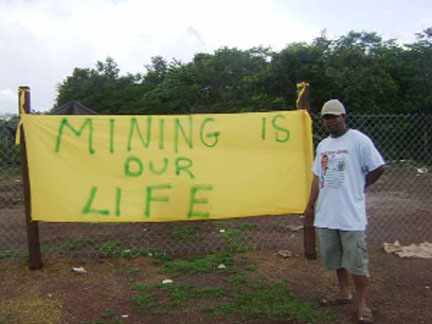Joycelyn’s chips
“Chips, chips, chips,” Joycelyn Ambrose peeks into the bars and shops of Mahdia, coaxing people to buy the plantain chips and mangoes that fill the basket she lugs.
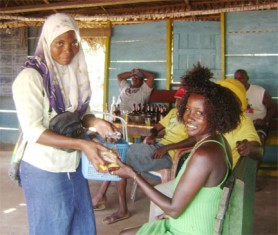
“Buy something,” she urges men, women and everybody. Many persons greet her and everyone seems to know her. In the red-dust-filled streets of Mahdia, their chatter rings out over the sounds of trucks and other vehicles in this mining village.
Located almost in the centre of Guyana in Region Eight, forest-encircled Mahdia is hot, dusty with year-round humidity but this does not seem to affect its residents. It is known well for one thing: gold; notorious for another: prostitutes; and anyone visiting the community is sure to be regaled with tales of too-adventurous miners and cunning women.
But underneath the numerous bars, in which one has just to sniff to catch a whiff of marijuana; the flashy lifestyles of those who have hit the jackpot and the humidity, is a story of survival and hard work. Mahdia, can be accessed by road and air and persons from all part of Guyana have descended there before moving into goldfields, all in an effort to improve their lives.
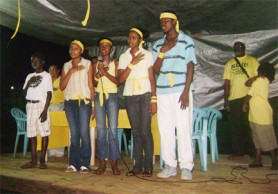
Ambrose, a single mother of six, said that she left her home in New Amsterdam six years ago because that community “ain’t gat no wuk for who get education and much less who ain’t got”. She said she went to Mahdia to make a better living for her and her children, four of whom are attending nursery, primary and secondary schools. “It is very hard because six years ago when I come here, I din come here and reach a house and a land,” she stated. She sold her chips and built a home for her family and credits this to mining. It is from this that she gets her daily bread, she says. “When nobody don’t deh in Mahdia, when everybody gone home fuh Christmas, gone home for December and all over, the place left lonely and me and me basket hollering ‘chips chips chips’ barely thinking… I could hardly afford anything because of the situation,” she explains. She said that mining supports not only families like hers and pointed to parents who send their children to school in the city.
Dianne, the small miner
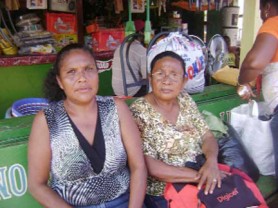
While Ambrose walks the red, dusty streets of Mahdia, Dianne Allicock burrows in the earth at Tumatumari seeking gold. A single mother of 11, the former security guard left Georgetown to seek a better life in the goldfields. She explained that the income from her former job was not enough but there were also other factors. “It was too stressful. I had to work in the night because I had to take care of my children in the day. It was too stressful that I couldn’t take it. It was telling on me nerves, me pressure and everything,” she said.
She has managed to secure a four-inch dredge but encounters obstacles in the fields and when she spoke to Stabroek News at Mahdia, had finished a “fight down”. She explained that someone – a bigger miner with an excavator – just showed up and told her that she had to move. She said she was told that the miner had paid the claim owner to work at the location. “They would come with the excavator and do what they have to do and come and tell the small miners ‘well y’all gat fuh move and ya’ll gat fuh go so,’” she explained. She moved.
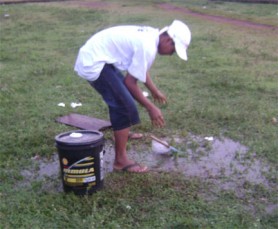
It is hard, Allicock stated, but if she does not work, her family will be unable to survive. She is often away from her children and is unhappy with the price of food items in the interior. The woman originally from Bartica – the mining hub of the interior – moved to Georgetown, then to Mahdia and has been mining for a year. She said she cannot do anything but mining right now. “I need my children to have an education because education is very important,” she stated.
Sagging buildings stand side-by-side with new modern, concrete edifices, all red with dust. At almost every corner is a bar, booming with dance hall (“Come leh me hammer yuh”), Brazilian (“Banda de javu”) and other different types of music. Explicit lyrics ring out. There are at least five churches in Mahdia and other missionaries are moving in.
George, seeking a better life
Sitting in a shadowy bar with several friends, George Canterbury, father of ten, says that he has been mining for 22 years. He worked with the state before, he said, but it was not enough to support his family, who live on the coast.
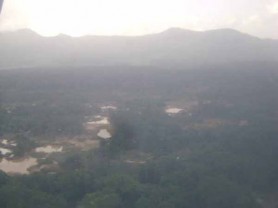
Some of his children are in a private school, he explained, “because I want them to get a better education. I don’t want them to come into the mining field”. The six miners who sit with him say that their families are on the coast too. If Georgetown offered better opportunities, he would not have ventured into the mines, Canterbury said. He stated that everything that he owns, he was able to get because of mining and is there to elevate himself and so his family can get a better living. Sometimes he is in the jungle for over a year and does not get to see his family; he said adding that he is “looking for an honest living”.
Surveys show that most miners are relatively young males. But there are those like Chris Pompey, 18, who sells vegetables at a stall in Mahdia to miners. He went to Mahdia from Georgetown because he could not find a job in the city, he said. He now sends money to his parents to help support them.
Mahdians are friendly people.
Brazilians
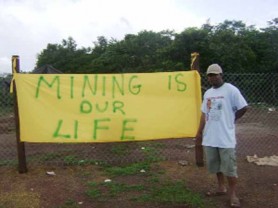
A mixture of all the six races of Guyana can be found in the community. Brazilians are present, with several operating businesses in the community. There are some tensions too. Elvira Cornette, a farmer at Tumatumari, is the mother of five and the grandmother of 32. She said that Brazilians do not want to give locals jobs and is of the view that their operations are the ones which damage the environment the most. According to her, the Brazilian miners only declare a little of their gold and diamonds to the authorities and smuggle the rest out of the country. She spoke of a trail which leads to the border, through which they enter and leave without notifying local authorities. “I think they should leave,” she declared.
Campbell Town
Bordering Mahdia is Campbell Town, an Amerindian community of over 300 persons. Manuel Francis, longtime resident said that “mining is actually the backbone in all homes. We are very low with the education system,” he added. He said that more emphasis should be placed on the area so that they can have “skilled people like nurses and teachers”. After youths leave school, he stressed, apart from mining, there are hardly any other employment opportunities. There are lots of drop-outs, he said, adding that he is concerned about underage miners. He noted that when young people go to the mines, they do not want to return to school. And it is because of financial problems at home that children also leave for the mines, he said. According to Francis, in terms of jobs, it is the smaller miners who try to assist while the bigger operations mostly take in their own personnel.
The village’s toshao, Ivan Pio, said that electricity is a major need in the community. He said that they had picketed to get piped water to the community but it is not yet in every home. Malaria is not rampant like before but incidents of illnesses like diarrhoea are rising, he said. And since the community began working with non-governmental organization, Red Thread, incidences of sexual abuse have dropped.
Meantime, Francis said, that they are still waiting on government to fulfil its promise of providing electricity in the area. He said that Prime Minister Samuel Hinds had promised that this would be done by this month but since then they have heard nothing.
‘Godfather’
The man who currently provides electricity to Mahdia is local businessman and Mahdia’s “godfather”, Roger Hinds. Many persons speak admiringly of him and the fact that he has risen from being a miner to owning several businesses and helping the community. “He does always try to help. We could always go to he,” one woman said.
There are many hardships in the mining-dependent community and a sense of humour is essential. At a rally for the mining industry earlier this month, gold-coloured flags adorned every building and everyone wore something yellow. Even the dogs and goats. The next day, as the sun broke through the clouds, two miners in long boots and shovels headed to the mines and one of them pointing to a goat with a yellow ribbon around its neck commented, “Even the goat protesting. Yuh hear he talk last night?”

